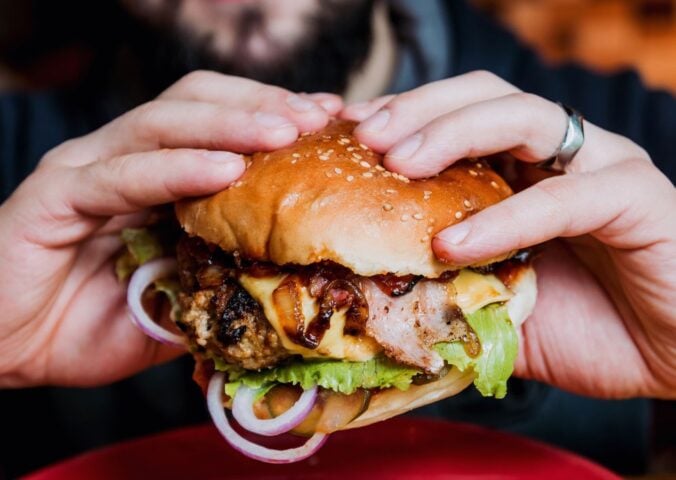The keto diet is ‘based on misinformation’ according to a leading cardiologist.
Plant-based advocate Robert Ostfeld, MD. MSc, is the Director of Preventive Cardiology at Montefiore Health System and an Associate Professor of Medicine at the Albert Einstein College of Medicine.
He made the comments in a recent video published by Plant Based News on its YouTube channel.
Keto diet
“As a cardiologist, I believe the keto diet is a mistake. The keto diet, I believe, is based on misinformation,” said Dr. Ostfeld.
“The general theme is that in the 1980s, the government told us to eat low fat.Then we ate low fat and look at us now: we’re fat and sick. It’s a really nice narrative, but it’s not true. We ate more of everything, including fat.
“So it’s based, I think, on fake news. There is no long-living population that is consistently in a state of ketosis. And the one population that often comes up is the Inuit population and they live very far North, near the Pole, and eat a lot of fish.
Well, they have similar heart disease rates as people in Canada, and actually the Inuit population, they’ve selected for a mutation, that makes it harder for them to go into ketosis, suggesting that it is not evolutionarily beneficial to be in a chronic state of ketosis.”
Keto diet omissions
Dr. Ostfeld pointed out that when people follow a keto diet, they are leaving healthy foods out of their diet, including whole grains, most fruits, and pulses like beans and lentils. The omission of fruit, he said, can have health implications.
He said: “Dr. Du found in a huge population out of China – like 500,000 people – it’s published in the New England Journal of Medicine and PLOS online, the more fresh fruit you ate, the better you did.
The less heart disease, less high blood pressure, the less diabetes. Yes, you eat more fresh fruit and you had less diabetes. I’m kind of getting sick of hearing about how fruit causes diabetes.”
Use of keto diet
According to Dr. Ostfeld, the keto diet is helpful for people with refractory epilepsy in the pediatric population. However, there are numerous side effects.
“Heart arrhythmias, mineral deficiencies, cardiomyopathy, fractures, kidney stones. They take it, they’re very careful with it. So I don’t think a ketogenic diet is your friend,” the doctor said. “And as a cardiologist, I recommend patients absolutely do not do it.”
Reasons people do the keto diet
Epilepsy aside, there are two general categories why people do the keto diet, according to the doctor. These include weight loss and diabetes.
He said: “Now in regard to weight loss, a ketogenic diet is helpful for short term weight loss, but so is cocaine.
“And what happens is if you don’t eat any carbs, you use up your glycogen stores in your body. That’s what glucose is stored as, and that holds water. So you use it up, you pee out the water, lose a little weight.
“When you initially start a ketogenic diet, you get something called the keto flu, and you feel a little crummy…So in the short term, you lose weight, but in meta-analysis of multiple randomized trials of weight loss with a keto diet versus a higher carb diet, there’s really only about less than a kilogram of difference in weight loss.”
Diabetes
According to Dr. Ostfeld, ameta analyses of large randomized trials longer term, ‘showed that there’s no significant difference between a higher carb, low fat and a ketogenic diet in terms of sugar control’.
He added: “Now, if you eat no sugar, your blood sugar levels will go down. But the issue is you’re not necessarily reversing the underlying reason why you have the diabetes. We’re talking about adult-onset, type two diabetes. You have diabetes in the first place. That’s the insulin resistance. And you’re just masking it by making it seem like your blood sugar is low.
“And what happens is when you’re eating more animal products, you get fat deposits in your muscle and your liver, causing insulin resistance, making it harder for the glucose to go from your blood into those places where it can be stored.”
Blood sugar
Dr. Ostfeld concluded: “Now, when you don’t eat sugar, it looks and your blood sugar goes down. So it looks like you’ve fixed the problem. But then when you sit within six feet of a donut, your blood sugar shoots up.
“So to me, reversing diabetes is not masking it, but actually being able to eat fruit and whole grains and not having your blood sugar go up.
“And we do have data from the Physicians Committee for Responsible Medicine, where eating a plant-based diet can improve insulin resistance and improve beta cell and the pancreas’s ability to make insulin. I’m not aware of any data to that effect with a ketogenic diet.”






